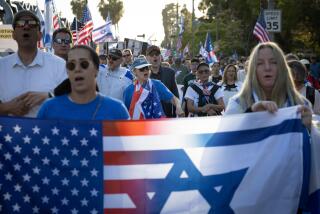Mideast Tensions Forging Unity for Iraqi Americans
- Share via
An estimated 15,000 Southland Iraqi Americans, many of whom were forced to leave Iraq for political and religious reasons, are increasingly coming together as a result of the standoff between Iraqi leader Saddam Hussein and the West.
Fears of another clash with the West--and further deterioration of their country--have forced Jews, Christians and Muslims to focus on their common roots.
As a result, they say, they are finding their religious and ethnic differences to be of less importance than their shared heritage.
“For myself, my roots are there. My education was there. I still have a house [in Baghdad],” said Suad Killu, president of the San Fernando Valley-based Iraqi Community Club, an association of 150 families that sponsors social get-togethers every few months. “How can I turn my back and forget?”
*
For Abraham Kattan, the tension over whether Iraq was risking attack by blocking United Nations weapon inspections made him recall another era.
Kattan, a gray-haired Jewish man who gestures with his hands as he speaks in an accented English, focused on a day in 1941 when he was 12, and the Iraqi government--then under the sway of the Nazis--stood by as a Baghdad riot resulted in about 100 Jewish deaths.
A Muslim neighbor he barely knew came to his door, declaring that anyone who wanted to get to the Kattans would have to kill him first.
“He saved my life,” Kattan, 68, said simply.
It is a story told to cherish the multiethnic history of Iraq, a type of story that seems to be told more often as Iraq’s future becomes more in doubt.
Because Southland Iraqi Americans are widely scattered, they have no hub. Yet in recent weeks, many members of the Iraqi Community Club have been getting in touch far more frequently.
That reaching out is an effort to compensate for the fact that Iraq’s culture is increasingly falling victim to the country’s wars and the sanctions leveled against it, Killu said. Increasingly, he said, it is Iraqis banding together abroad who are rediscovering their cultural heritage and helping keep it alive, fearful that the nation could be obliterated.
It becomes more meaningful, for example, to emphasize that in Iraqi culture, “before you do business with someone, they invite you to tea and coffee and pastries,” said Killu, a Christian. “Only after they see how you sit, how you eat, how you talk, will they talk business. They want to first know who you are.”
Iraqi Americans “have to be one solid community, not scattered individuals, and we must help each other out,” he said. “Whether we are Christian, Muslim or Jewish, we all have relatives back in Iraq, and we all care about our people.”
Yasin Alkalesi, a senior lecturer of Arabic and culture at UCLA, and a Muslim, phones Iraq at least once a month, often in the early hours of the morning just to get through. The stories he hears when he does get through haunt him, often the consequence of sanctions intended to force Hussein from power.
“Every other person I knew and members of my family are dead,” he said. “I hear of friends’ daughters who are on the street, doing prostitution, because this is the only way they can earn a living.”
*
A few years ago, Alkalesi heard that a friend with whom he had gone to elementary and high school was to undergo a minor operation. But he said the hospital surgeons had no disinfectant to sterilize their instruments, and as a result the friend died of postoperative infection.
For Jewish artist Sara Shai, who left Baghdad when she was 3 in 1950, her last memory of her homeland was that of authorities confiscating her mother’s china as her family fled the country.
She had never looked back.
“I feel a deep disappointment with Iraq,” she said recently. “We were one of the first civilizations in the world. Now we are one of the most backward civilizations.”
Yet last weekend, Shai found herself at a Middle Eastern cultural salon in Benedict Canyon, practicing her few words of Arabic, discussing news from Iraq, and listening intently to the type of Middle Eastern music she had grown up with.
Elie Chalala, the Lebanese editor of Al Jadid magazine, a local English language magazine of Arabic culture and arts, many of whose readers are Iraqi, said most Iraqis in America “want an independent Iraqi regime with free elections, securing basic individual rights.” But he said many Iraqis are afraid that their position will be misunderstood by others, leading to reprisals back home, not just against the immediate family, but even distant cousins.
Jordan Elgrably, 39, founder of Ivri-Nasawi, an association for mostly Middle Eastern Jews, said recent events in Iraq and the Middle East have sharpened the association’s focus on “the deplorable lack of leadership in Los Angeles, where dialogue between the Arab and Jewish communities has broken down.” Elgrably sees the coming together of local ethnic communities as an initial step in stepping back from the brink.
To that end Ivri-Nasawi has tentatively scheduled an Arab-Jewish forum for February, featuring six panelists on all sides of the religious divide.
Says Sara Shai: “Iraqi culture is different from any other. As an Iraqi Jew, I feel I have roots to the first Jew, who is Abraham, and to the original Jewish community. That’s the connection I’m missing now.
“Somehow, I’d like to reconnect. Especially now.”
More to Read
Get the L.A. Times Politics newsletter
Deeply reported insights into legislation, politics and policy from Sacramento, Washington and beyond. In your inbox twice per week.
You may occasionally receive promotional content from the Los Angeles Times.










